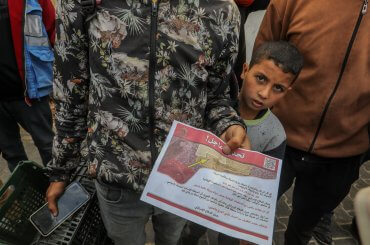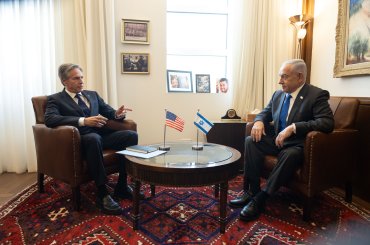Bruce Wolman writes:
Speakers at the AIPAC policy conference regularly said that some Arab nations are on the same page with Israel in considering the Iranian nuclear program the biggest threat to regional stability, but the Egyptian Foreign Ministry articulated a different message yesterday.
According to the Jerusalem Post, Ministry spokesman Hossam Zaki said that Western policies aimed at "pressuring Iran to give up its nuclear program will fail because they disregard Israeli nuclear capabilities." More critically, Egypt called the Israeli nukes "the first and greatest threat to security in the region."
Needless to say, Israel did not take the statement kindly. Yigal Palmor, an Israeli Foreign Ministry spokesman rejected the Egyptian characterization, adding
If he can quote at least one occasion in which Israel has threatened any of its neighbors with the alleged nuclear weapon, then his statements would gain him credibility. Unless he produces evidence to support his claims, these kinds of remarks are completely out of line.
Does Israel really want us to go there? According to globalsecurity.org, hardly a disarmament web site:
The total Israeli nuclear stockpile consists of several hundred weapons of various types, including boosted fission and enhanced radiation weapons ("neutron bombs"), as well as nuclear artillery shells. Strategically, Israel uses its long-range missiles and nuclear-capable aircraft (and, some say, submarines with nuclear-armed cruise missiles) to deter both conventional and unconventional attacks, or to launch "the Samson Option", an all-out attack against an adversary should defenses fail and population centers be threatened. In addition, despite Israel's insistence that it "will not be the first to introduce nuclear weapons into the Middle East," these systems represent an effective preemptive strike force. At the same time, Israel deploys tactical systems designed to rapidly reduce an invading force. Following the 1973 war, Israel fielded at least three batteries of atomic-capable self-propelled 175mm cannons equipped with a total of no less than 108 warheads, and placed atomic land mines in the Golan Heights during the early 1980s.
Nuclear weapons need not be detonated to be used as weapons. Early in the 1973 war, Israel went on a nuclear alert, partly in the knowledge that it would be detected by the United States and the Soviet Union. The Soviets, Israel assumed, would restrain their Arab allies while the Americans would speed up resupply efforts. While the USSR did inform Egypt that Israel had armed three nuclear weapons, the extent to which Israel's nuclear alert affected the timing of Washington's subsequent decision to rearm Israel is not clear.
Since the intelligence services of Israel's neighbors can search online just as easily as we can, a reasonable conclusion for them to draw is that Israel's ideas about tactical nuclear weapons in the region represent a real threat.
Zaki announced that Egypt "sought to realize the aims of the Nuclear Non-Proliferation Treaty to guarantee the security of all states, whereas possession of nuclear weapons by some countries disrupted the balance of power and encouraged other nations to address this imbalance by seeking to acquire nuclear weapons."
At the AIPAC conference an optimistic Jane Harman "hopefully" pointed out the conflicts Egypt was having with Hezbollah and Iran. But only a few hours earlier Egypt had "called on the international community to justify and indiscriminately apply the Non-Proliferation Treaty that requires states to comply with its provisions, and asked it to refrain from the adoption of double standards in pressuring states to abandon their programs."
An Egyptian official directly told the Jerusalem Post that Egypt preferred Israel to pursue diplomacy rather than a military option in confronting Iran's nuclear program.
And lest anyone regard the Foreign Ministry briefing as pro forma, the Egyptian daily Al-Ahram reported on Sunday that President Hosni Mubarak told Philippine President Gloria Macapagal-Arroyo in a meeting that "Egypt opposed any proliferation in the region and that efforts aimed at shedding light on the Iranian nuclear program must be accompanied by parallel efforts to deal with the Israeli program."
I have seen no reference to these reports in the US media. We are left to wonder if President Mubarak raised the issue with Secretary of Defense Gates this morning. Had Egypt called for strong sanctions against Iran, it certainly would have been headlines in the New York Times and Washington Post.
Going by Egypt's public statements, pro-AIPAC Democrats may need more than hope to see fulfilled their desired Arab-Israeli alliance against Iran.
[Weiss comment: Egypt's evident concern with Israeli nukes lends support to the theory that the '67 War was precipitated in part by Nasser's worries about Israel getting the bomb. Nukes are destabilizing. More reason to enforce the NPT.]

